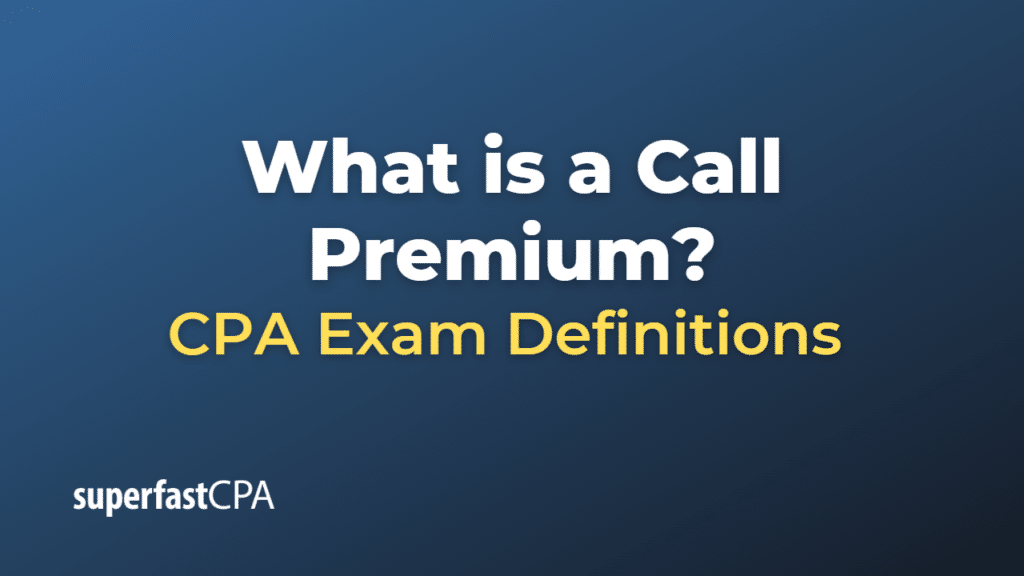Call Premium
A call premium is the price paid by the buyer (holder) of a call option to the seller (writer) of the option. The call premium compensates the seller for taking on the risk of the potential obligation to sell the underlying asset at the predetermined strike price if the buyer exercises the option. The call premium is typically quoted on a per-share basis and varies depending on factors such as the time remaining until the expiration date, the strike price, the price of the underlying asset, and the volatility of the underlying asset.
Call premiums are influenced by the following factors:
- Intrinsic value: The intrinsic value of a call option is the difference between the market price of the underlying asset and the strike price, but only when the option is in-the-money (when the market price is above the strike price). If the call option is out-of-the-money (when the market price is below the strike price), the intrinsic value is zero.
- Time value: The time value of a call option represents the potential for the option to become in-the-money before its expiration date. Options with more time until expiration generally have higher time value, as there is a greater chance that the price of the underlying asset will increase and make the option in-the-money.
- Volatility: The volatility of the underlying asset also affects the call premium. If the underlying asset has higher volatility, there is a greater chance that the option will become in-the-money, which results in a higher call premium.
- Interest rates: Call premiums can be influenced by prevailing interest rates. Generally, when interest rates rise, call premiums increase, as the cost of holding the underlying asset becomes more expensive for the option writer.
In summary, a call premium is the price paid by the buyer of a call option to the seller for the right, but not the obligation, to purchase the underlying asset at the predetermined strike price within a specific period or on a specific date. The call premium is influenced by factors such as the intrinsic value, time value, volatility, and interest rates.
Example of a Call Premium
You’re interested in buying a call option for a company called “FutureTech Inc.” The current market price of FutureTech Inc.’s stock is $50 per share. You believe that the stock price will rise over the next two months, so you decide to purchase a call option to potentially profit from this anticipated price increase.
You find a call option with a strike price of $55 and an expiration date two months from now. The call premium for this option is quoted at $2 per share.
To purchase one call option contract, which typically represents 100 shares of the underlying stock, you would need to pay a total call premium of $200 ($2 per share x 100 shares). This amount is paid to the seller (writer) of the call option as compensation for the risk they are taking in case you decide to exercise the option.
Two possible scenarios can unfold over the next two months:
- The stock price increases: If FutureTech Inc.’s stock price rises to $65 per share before the expiration date, your call option is now in-the-money. You can exercise the option and buy 100 shares of FutureTech Inc. for the strike price of $55 per share, for a total cost of $5,500. Since the market value of these shares is now $6,500 ($65 per share x 100 shares), you make a gross profit of $1,000 ($6,500 – $5,500). However, you also paid a $200 call premium for the call option, so your net profit is $800 ($1,000 – $200).
- The stock price decreases or remains below the strike price: If FutureTech Inc.’s stock price falls to $45 per share or stays below the strike price of $55 by the expiration date, your call option is out-of-the-money. Exercising the option in this scenario would result in a loss, as you would be buying the stock for more than its current market value. In this case, you would let the option expire worthless and lose the $200 call premium you paid for it.
In this example, the call premium is the cost you paid to obtain the right to potentially profit from the anticipated increase in FutureTech Inc.’s stock price. The call premium is influenced by factors such as the time remaining until expiration, the strike price, the underlying asset’s price, and market volatility.













